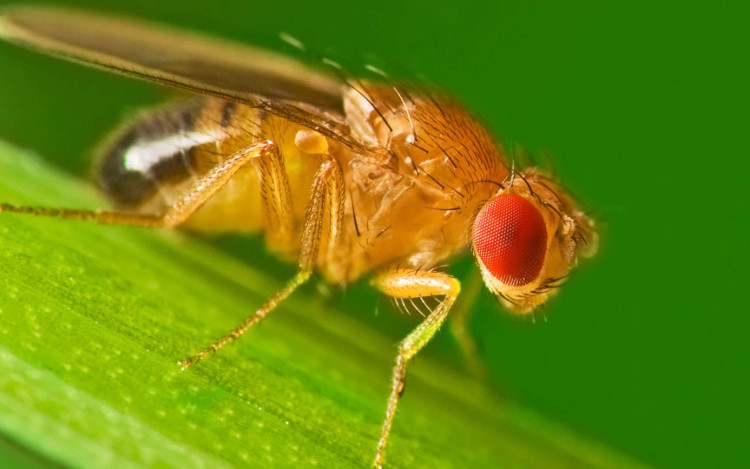Fruit flies - animals that contribute to six Nobel prizes
Owning DNA similar to humans, fruit flies were selected as experimental subjects in many Nobel-winning scientific studies.
Fruit flies contribute greatly to many scientific achievements, including the study of winning the 2017 Nobel Prize in Medicine for the biological rhythm control gene of three scientists Jeffrey Hall, Michael Rosbash and Michael Young, Guardian on 8 October. believe. "I am very happy for the fruit flies," Rosbash said when he learned he had won the Nobel Prize.
At least 5 other studies using fruit flies also won the Nobel Prize, the first in 1933. At that time, American biologist Thomas Morgan studied fruit flies and confirmed the gene on chromosome-like particles. beads, some genes are linked together, meaning they are inherited together. Thanks to that, Morgan opened a new era for modern genetics .

The study won the 2017 Nobel Prize in Medicine in the fruit fly.(Photo: Why Files).
Fruit flies and humans have similar DNA up to 60%. Scientists believe that about 75% of human genetic diseases can also be found in fruit flies. "Almost fruit flies are born to help scientists," said geneticist Steve Jones.
Fruit flies like to eat fruits, especially ripe fruits. In the summer, they often lay eggs in fruits like apples, pears and sweet drinks. They do not affect human health and have many ideal characteristics to grow in the laboratory: the life cycle lasts only two weeks, mainly eating corn flour, yeast, sugar and many other easy-to-find foods. Scientists can also easily store them in small tubes.
"Just one female and one male live together, about two weeks later you'll have a whole bunch of new fruit flies. This helps them become a powerful tool for studying genetic mutations , " Simon Collier , PhD at Cambridge University, said.
Fruit flies also possess many other important traits that impress scientists. Their genome consists of only four pairs of chromosomes, and 23 in humans. That means studying gene function and learning how genes interact in fruit flies much easier."The fruit flies' genes have a high mutation rate, which is very useful in research , " Jones added.
Fruit flies play a key role in shedding light on many biological processes for nearly a century."Thanks to a series of studies, fruit flies are currently the most well-known creature. With this knowledge, we can perform experiments in fruit flies and get results in just three weeks. This process it may take a whole year if done in mice, " said Andreas Prokop, a professor at Manchester University.
Researching fruit flies is a quick, inexpensive way to explore complex biological problems that can then be applied in medicine. They helped Prokop understand more about axons of nerve cells. These axons often degenerate when they get old, but at a faster and more severe rate in people with Alzheimer's or other degenerative diseases.
"Cell death is the biological process that takes place in every living organism, from worms to humans. It is basically a mechanism of suicide essential for life and the first key points discovered in fruit flies. When cells are damaged, the cell death process is activated, they die so that organs in the body remain healthy, "said Pascal Meier, professor of Cancer Research.

The fruit flies' DNA is 60% human.(Photo: Guardian).
However, in cancer patients, this process does not occur, contributing to the spread of tumors. " By studying fruit flies, we know that cell death-inducing protein inhibitors (IAPs) participate in this process. They prevent cell death. In other words, if IAP levels rise, the process of dying Cell shedding will be hampered and cancer will grow, ' Meier added.
Scientists are testing drugs that can inhibit IAP in humans, thereby allowing cell death to resume functioning. According to Meier, this is a very promising solution.
Today, fruit flies become an important part of research centers. The University of Cambridge fly research department has more than 60,000 fruit fly tubes and provides carefully cross-bred flies for about 30 research groups.
"Most of these groups are working on human problems or other general biological problems. Only two or three groups study the fruit flies themselves," Collier said.
- Unexpected discoveries of tiny fruit flies
- Why does the fruit fly have 23 times longer sperm than the body?
- Fruit flies die early because they cannot be loved
- Fruit-devouring fruit flies in England
- The story is not about the Nobel prizes have far-reaching influence in history
- Fruit flies also know 'think' before acting
- The most famous Nobel prizes in history
- Male flies produce sex stimulants to attract female flies
- The fruit fly flies backwards
- Fruit flies return to Africa
- 'Hunger' sex, fruit flies turn to self-stimulation with alcohol
- Kill fruit flies with biotechnology
 Why do potatoes have eyes?
Why do potatoes have eyes? 'Tragedy' the world's largest carnivorous life: Death becomes ... public toilet
'Tragedy' the world's largest carnivorous life: Death becomes ... public toilet Tomatoes were once considered 'poisonous' for 200 years
Tomatoes were once considered 'poisonous' for 200 years Detecting microscopic parasites on human face
Detecting microscopic parasites on human face